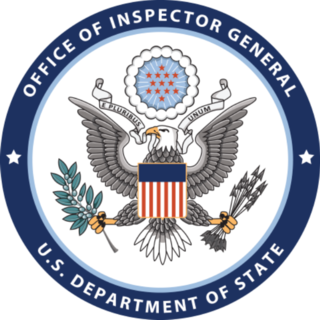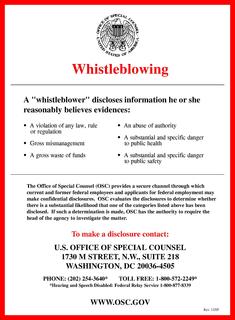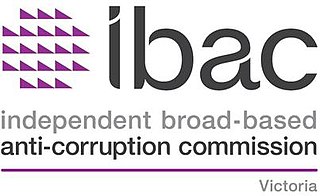Related Research Articles
A whistleblower is a person, usually an employee, who exposes information or activity within a private, public, or government organization that is deemed illegal, illicit, unsafe, or a waste, fraud, or abuse of taxpayer funds. Those who become whistleblowers can choose to bring information or allegations to surface either internally or externally. Over 83% of whistleblowers report internally to a supervisor, human resources, compliance, or a neutral third party within the company, with the thought that the company will address and correct the issues. Externally, a whistleblower can bring allegations to light by contacting a third party outside of the organization such as the media, government, or law enforcement. The most common type of retaliation reported is being abruptly terminated. However, there are several other activities that are considered retaliatory, such as sudden extreme increase in workloads, having hours cut drastically, making task completion impossible or otherwise bullying measures. Because of this, a number of laws exist to protect whistleblowers. Some third-party groups even offer protection to whistleblowers, but that protection can only go so far. Two other classifications of whistleblowing are private and public. The classifications relate to the type of organizations the whistleblower works in: private sector, or public sector. Depending on many factors, both can have varying results. About 20% of whistleblowers are successful in stopping the illegal behaviors, usually through the legal system, with the help of a whistleblower attorney. For the whistleblower's claims to be credible and successful, the whistleblower must have compelling evidence to support their claims, that the government or regulating body can use or investigate to "prove" such claims and hold corrupt companies and/or government agencies accountable. A whistleblower case would never continue on legally, or ever be reported via the news, without substantial and compelling evidence.
Transparency International e.V. (TI) is a German registered voluntary association (Eingetragener Verein) founded in 1993 by former employees of the World Bank. Based in Berlin, its nonprofit and non-governmental purpose is to take action to combat global corruption with civil societal anti-corruption measures and to prevent criminal activities arising from corruption. Its most notable publications include the Global Corruption Barometer and the Corruption Perceptions Index. Transparency International serves as an umbrella organization. From 1993 till today its members have grown from a few individuals to more than 100 national chapters which engage in fighting perceived corruption in their home countries. TI is a member of G20 Think Tanks, UNESCO Consultative Status, United Nations Global Compact, Sustainable Development Solutions Network and shares the goals of peace, justice, strong institutions and partnerships of the United Nations Sustainable Development Group (UNSDG). TI confirmed the dis-accreditation of the national chapter of United States of America in 2017.

Jesselyn Radack is an American national security and human rights attorney known for her defense of whistleblowers, journalists, and hacktivists. She graduated from Brown University and Yale Law School and began her career as an Honors Program attorney at the U.S. Department of Justice.
The National Security Whistleblowers Coalition (NSWBC), founded in 2004 by former FBI translator Sibel Edmonds in league with over 50 former and current United States government officials from more than a dozen agencies, is an independent, nonpartisan alliance of whistleblowers who have come forward to address weaknesses of US security agencies.

The Office of Research Integrity (ORI) is a U.S. government agency that focuses on research integrity, especially in health. It was created when the Office of Scientific Integrity (OSI) in the National Institutes of Health (NIH) and the Office of Scientific Integrity Review (OSIR) in the Office of the Assistant Secretary for Health merged in May 1992. The Office of Research Integrity oversees and directs Public Health Service (PHS) research integrity activities on behalf of the Secretary of Health and Human Services with the exception of the regulatory research integrity activities of the Food and Drug Administration.

Kohn, Kohn & Colapinto is a Washington, D.C.-based international whistleblower rights law firm specializing in anti-corruption and whistleblower law, representing whistleblowers who seek rewards, or who are facing employer retaliation, for reporting violations of the False Claims Act, Foreign Corrupt Practices Act, Dodd-Frank Wall Street Reform, Sarbanes-Oxley Acts, Commodity and Security Exchange Acts and the IRS Whistleblower law.

The Whistleblower Protection Act of 1989, 5 U.S.C. 2302(b)(8)-(9), Pub.L. 101-12 as amended, is a United States federal law that protects federal whistleblowers who work for the government and report the possible existence of an activity constituting a violation of law, rules, or regulations, or mismanagement, gross waste of funds, abuse of authority or a substantial and specific danger to public health and safety. A federal agency violates the Whistleblower Protection Act if agency authorities take retaliatory personnel action against any employee or applicant because of disclosure of information by that employee or applicant.

The Office of Inspector General for the Department of State (OIG) is an independent office within the U.S. Department of State with a primary responsibility to prevent and detect waste, fraud, abuse, and mismanagement. OIG inspects more than 270 embassies, diplomatic posts, and international broadcasting installations throughout the world to determine whether policy goals are being achieved and whether the interests of the United States are being represented and advanced effectively.
The Government Accountability Project (GAP) is a nonprofit whistleblower protection and advocacy organization in the United States. It was founded in 1977.
The National Whistleblower Center (NWC) is a nonprofit, nonpartisan, tax exempt, educational and advocacy organization based in Washington, D.C. It was founded in 1988 by the lawyers Kohn, Kohn & Colapinto, LLP. As of March 2019, John Kostyack is the executive director. Since its founding, the Center has worked on whistleblower cases relating to environmental protection, nuclear safety, government and corporate accountability, and wildlife crime.
Jane Turner entered the Federal Bureau of Investigation (FBI) as a Special Agent in October 1978. She was assigned to the Seattle Division and became the first female SWAT member and the first female Profile Coordinator. She was involved in the capture of Christopher Boyce, and in the Green River Killer investigation.
Whistleblowers Australia Inc. is an association for those who have exposed corruption or any form of malpractice, especially if they were then hindered or abused, and for those who are thinking of exposing it or who wish to support those who are doing so. The organisation began as Whistleblowers Anonymous in 1991.

A whistleblower is a person who exposes any kind of information or activity that is deemed illegal, unethical, or not correct within an organization that is either private or public. The Whistleblower Protection Act was made into federal law in the United States in 1989.
Whistle Blowers Protection Act, 2011 is an Act of the Parliament of India which provides a mechanism to investigate alleged corruption and misuse of power by public servants and also protect anyone who exposes alleged wrongdoing in government bodies, projects and offices. The wrongdoing might take the form of fraud, corruption or mismanagement. The Act will also ensure punishment for false or frivolous complaints.
James Wasserstrom is a US diplomat who currently serves as an anti-corruption officer at the US embassy in Kabul.

Jordan Andolini Thomas is an American attorney, writer, speaker and media commentator. He is a partner and Chair of the Whistleblower Representation Practice at Labaton Sucharow LLP (2011–present), where he represents whistleblowers reporting violations of the federal securities laws to the U.S. Securities and Exchange Commission (SEC).

The Independent Broad-based Anti-corruption Commission (IBAC) is Victoria's anti-corruption agency with jurisdiction over the public sector. It does this by:

Andrew P. Bakaj is a Washington, DC attorney and former intelligence officer with the Central Intelligence Agency. He was the principal attorney representing the whistleblower who filed the initial complaint that led to the launch of multiple investigations by the United States Congress into the Trump–Ukraine scandal, the impeachment inquiry into President Donald Trump, and, ultimately, the first Impeachment of Donald Trump.
References
- ↑ Annan, Kofi (19 December 2005). "Secretary-General's Bulletin - Protection against retaliation for reporting misconduct and for cooperating with duly authorized audits or investigations". undocs.org. United Nations. ST/SGB/2005/21. Retrieved 24 March 2017.
- ↑ "The UN Ethics Office promotes an ethical organizational culture based on our shared values of integrity, accountability, transparency and respect. It is independent, impartial, confidential and professional". www.un.org. Retrieved 2017-08-10.
- ↑ "The UN Ethics Office promotes an ethical organizational culture based on our shared values of integrity, accountability, transparency and respect. It is independent, impartial, confidential and professional". www.un.org.
- ↑ "Associated Press News". bigstory.ap.org.
- ↑ "Thirty Eight Questions – How corruption & incompetence in the UN turned loyalty into a problem". peteragallo.com.
- ↑ "UN investigator files lawsuit claiming defamation and retaliatory actions in workplace".
- ↑ "United Nations - Elia Yi Armstrong". esa.un.org.
- ↑ "Secretary-General Appoints Elia Armstrong of Canada Director of Ethics Office - Meetings Coverage and Press Releases". www.un.org.
- ↑ "Ban Ki-moon Should Strengthen (Not Weaken) Whistleblower Protections at the UN - GAP". www.whistleblower.org.
- ↑ "The U.N.'s Investigation Wars".
- ↑ Lynch, Colum (3 May 2008). "Reports Fault U.N. Watchdog Unit" – via www.washingtonpost.com.
- ↑ MacFarquhar, Neil (16 June 2010). "Review Panel Judges See a Culture of U.N. Secrecy". The New York Times.
- ↑ "UNHCR Whistleblower Wins Case before the UN Dispute Tribunal - GAP". www.whistleblower.org.
- ↑ NGUYEN-KROPP POSTICA v. SECRETARY-GENERAL OF THE UNITED NATIONS